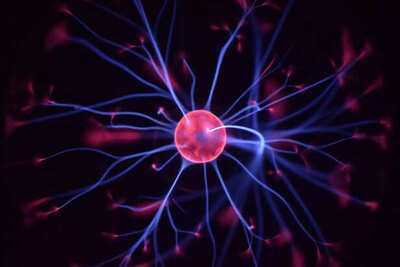
From movies to ancient texts, the notion that people witness their whole life in an instant before dying has captured human imagination for centuries. Some describe it as a vivid replay of childhood memories, faces of loved ones, or important life moments flashing by in seconds. While the idea is comforting or even spiritual for many, others dismiss it as folklore or a trick of the brain.
So, what really happens at the edge of life? Do we truly get to watch a highlight reel of our journey, or is it just a product of brain activity during extreme stress? Let’s look at myths, cultural beliefs, and scientific explanations that surround this mystery.
1. Cultural and Spiritual Beliefs

A glowing cross set against darkness symbolizes humanity’s quest for meaning at life’s end—where spiritual beliefs and cultural narratives see the “life review” as part of the soul’s journey and transition to the afterlife.
Across the world, cultures and religions have shaped the narrative of life flashing before death.
- Hinduism and Buddhism: Scriptures suggest that at the time of death, karmic impressions and past deeds are recalled, influencing rebirth.
- Christianity: Some accounts describe the dying soul reviewing life’s actions before divine judgment.
- Folk Traditions: In many cultures, elders pass down stories of ancestors reliving memories at the moment of passing, symbolizing closure.
These beliefs often tie the “life review” to morality, the soul’s journey, or the transition to another realm.
2. Near-Death Experiences (NDEs)

A silhouetted figure stands at the edge of light, evoking the mysterious transition described in near-death experiences—where vivid memories and flashes of life unfold beyond the ordinary.
Modern stories of near-death experiences (NDEs) often fuel this idea. People who survive cardiac arrests, accidents, or medical trauma sometimes report:
- Seeing vivid flashes of their childhood.
- Reliving emotional memories in extraordinary detail.
- Feeling like they are watching a movie of their life.
These accounts are strikingly similar across different cultures, making researchers wonder if there’s a universal neurological or psychological explanation.
3. Scientific Explanations

A burst of electric energy radiates outwards, representing the brain’s remarkable ability to trigger vivid, emotionally intense memories in moments of crisis shedding light on the scientific roots of life review experiences before death.
Science offers some fascinating insights into why people might experience a life review before death. Studies reveal that just before death, the brain can produce a surge of electrical activity, creating a hyperactive state that may trigger rapid recall of memories. The temporal lobe, which is closely linked to memory, can also become overstimulated during trauma or when the brain is deprived of oxygen, leading to vivid recollections. In addition, the release of dopamine and endorphins chemicals that generate feelings of pleasure and calm can make these memories appear more emotionally intense. Another factor is the way our perception of time changes under stress; moments of crisis can make seconds feel like minutes, giving the impression of reliving many memories in a short span. While these explanations do not confirm that everyone experiences a life review, they suggest that the brain has the remarkable capacity to create such phenomena.
4. Myth or Reality?

A hazy double exposure evokes the blurred boundary between myth and reality reflecting how the idea of life review before death remains a captivating possibility, shaped by science, spirituality, and our longing for meaning.
So far, there is no concrete scientific proof that
all people see their whole life before death. Some experience it, others don’t. It might depend on individual brain chemistry, circumstances of death, or even cultural conditioning. What’s clear is that the idea continues to fascinate both believers and skeptics, bridging science with spirituality.
Final ThoughtsThe concept of life flashing before our eyes at death may never be fully proven or dismissed. For some, it is a myth rooted in culture; for others, it is a spiritual truth. Science, meanwhile, suggests that the brain’s extraordinary functions during crisis could create such vivid experiences.
Whether real or symbolic, the life review reflects humanity’s deep desire for meaning, closure, and reflection at life’s end. Perhaps the idea itself offers comfort: that our lives, in the end, will be acknowledged in their entirety.
FAQs(Frequently Asked Questions):
What do most people describe when they talk about a life review?
Many describe seeing vivid childhood moments, loved ones, or emotionally significant experiences as if watching a fast movie of their life.
Can medical equipment capture what the brain experiences during death?
Not exactly while brain scans can detect electrical surges and patterns, they cannot record subjective experiences like memories or visions.
Could the feeling of a life review happen in non-death situations?
Yes, some people report similar flashes of memory during extreme danger, accidents, or life-threatening events where the brain reacts under intense stress.
 From movies to ancient texts, the notion that people witness their whole life in an instant before dying has captured human imagination for centuries. Some describe it as a vivid replay of childhood memories, faces of loved ones, or important life moments flashing by in seconds. While the idea is comforting or even spiritual for many, others dismiss it as folklore or a trick of the brain.
From movies to ancient texts, the notion that people witness their whole life in an instant before dying has captured human imagination for centuries. Some describe it as a vivid replay of childhood memories, faces of loved ones, or important life moments flashing by in seconds. While the idea is comforting or even spiritual for many, others dismiss it as folklore or a trick of the brain.



